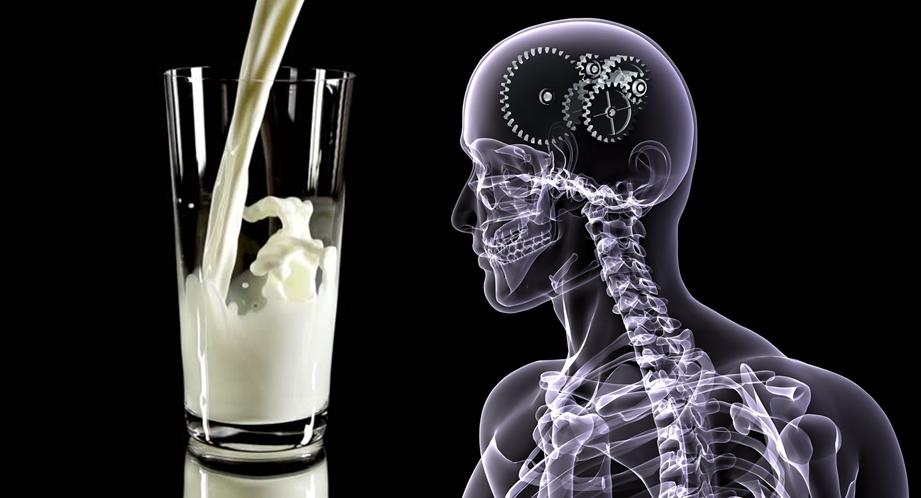
It may sound outrageous to some, but the fact that milk can make you smarter is nothing but common sense when you dig into the details.
When thinking about mental health, it is easy to think about things like reading, word puzzles, and exercise but diet probably has a bigger impact. Good nutrition is vital for proper cognitive function. If your body doesn’t have the best fuel, you can’t expect the best performance.
Milk offers your body an array of valuable, bio-active compounds – the biological building blocks for good health.
The research is showing that a dairy-rich diet will help you to be smarter and improve your memory. Your brain works better with milk- because (according to your body) milk is a top grade fuel source.
Milk improves cognitive function
There is current research showing milk’s positive effects. The effects are real and significant when compared to people who didn’t drink milk:
- Researchers from the University of South Australia and University of Maine found that adults who consumed the most dairy products had higher cognitive function and the highest scores in an extensive cognitive test (Source) 2011
- A study on older people found that when supplemented with 200 ml/day probiotic milk resulted in higher Mental State Examination (MMSE) scores (Source) 2016
- The University of Maryland School of Public Health followed football players and found that the Athletes who drank milk, compared to those who did not (regardless of concussions), scored higher after the season than before it started, specifically in the areas of verbal and visual memory.“ (Source) 2016
- Countries in which people drink the most milk, per capita, also win the most Nobel Prizes, per capita. (Source) 2013
Milk has Brain building blocks
Why would something as simple as milk be good for your brain? Because milk has many of the biological components your brain needs for growth, forming new cells and connections, and maintaining high cognitive function.
Many of the components of milk support brain health:
1. Proteins
Your brain cells communicate via chemical messengers called neurotransmitters which are made of amino acids, the building blocks of protein. Drinking milk raises the levels of an amino acid called tyrosine, which prompts the brain to manufacture norepinephrine and dopamine, other kinds of chemical messengers in the brain.
Tyrosine – According to Web MD – “People take tyrosine for ADD (attention deficit disorder), attention deficit-hyperactivity disorder (ADHD),for depression, the inability to stay awake (narcolepsy), and improving alertness following sleep deprivation. It is also used for stress, premenstrual syndrome (PMS), Parkinson’s disease, Alzheimer’s disease, chronic fatigue syndrome (CFS), alcohol and cocaine withdrawal, heart disease and stroke, ED (erectile dysfunction), loss of interest in sex, schizophrenia, and as a suntan agent and appetite suppressant.” – (Source)
Milk is a good source of tyrosine with 1,860-2,234 mg/ cup (Source). You can buy expensive tyrosine supplements from Dr. OZ or you could just drink milk.
2. Fats and Ketones
Did you know that our brains make up 5% of our bodies mass, but use 20-30% of our energy? We are different than most mammals in that our brains demand a heavy amount of fuel. And our brains preferred fuel source are ketones aka fat.
Whole milk is a good source of healthy fat. The variety of fatty acids or triglycerides in milk have many positive benefits on the body. MCTs (medium chain triglycerides) are easier to metabolize and can directly support the brain’s normal energy needs without being stored as fat in the body.
Ketones are the energy producing by-products of fat metabolism. All the organs in your body, tissue, and even your brain use ketones. It’s been found that ketones are more efficient energy source than glucose as they provide more energy per unit oxygen used. Ketones feed your brain more directly and efficiently than glucose. Our brains were designed to use fat as our primary fuel source.
Guowei Huang, brain health expert and dean of School of Public Health, Tianjin Medical University said, “Compared with healthy young people, the brain of the elderly utilizes glucose at only 85-90% the rate of young people while patients with Alzheimer’s disease utilize only around 75%. (Source)
As you age, glucose becomes a poorer, less efficient fuel source for your brain. Eating healthy fats is important to maintain good cognitive function. Milk has the fuel source your brain needs.
No diet will remove all the fat from your body because the brain is entirely fat. Without a brain you may look good, but all you could do is run for public office – George Bernard Shaw
3. Cholesterol
Dietary cholesterol is critical for healthy cognitive and memory function. 25% of the body’s cholesterol is in the brain. For children, fat and cholesterol are necessary for healthy brain and nervous system’s development.
Excessively low cholesterol levels in the brain of autistic children are recognized as a concern and detriment to normal brain development and function. (Source)
Cholesterol enhances signal transport and the functioning of the synapses of the brain and protects the bioelectrical signals. It also works as an anti-oxidant to protect brain cells from oxidative damage
4. Glutathione
Milk drinkers have been found to have higher levels of an antioxidant called glutathione. Glutathione helps stave off oxidative stress and the resulting damage caused by reactive chemical compounds produced during the normal metabolic process in the brain (Source) (Source)
According to In-Young Choi, an associate professor of neurology, Oxidative stress is known to be associated with a number of different diseases and conditions, including Alzheimer’s disease, Parkinson’s disease and many other conditions. American Journal of Clinical Nutrition
5. Galactose
That milk sugar lactose is composed of glucose and galactose. Galactose is nicknamed the “brain sugar.”
Galactose has been shown to be a very beneficial sugar in milk that is an essential nutrient for the human body. Galactose contributes directly (as well as through bonds by way of contact points on cells) to vital information and control processes in the body. It also functions as a fundamental and structural substance for cells, cell walls, and intracellular matrix.
Galactose supports the brain development of babies and children. Studies have indicated that the monosaccharide sugar helps triggers long-term memory formation and enhances cellular communication.
6. Sialic Acids
Milk contains a high concentration of sialic acid
Sialic Acid plays an essential role for brain development and cognition, and is important for developing children as they need an adequate supply during formative years. The human brain has more sialic acid than the brains of other mammals (2 – 4 times more). Researchers believe that sialic acid has a decisive role in enabling neurotransmission between neurons. Studies have shown that sialic acid has an influence upon brain development and learning. Higher levels of Sialic acid in the body have been shown to enhance learning with greater comprehension, and fewer mistakes. (Source)
7. Iodine
Milk is an important source of iodine. Iodine has been shown to have a positive effect on mental health. People who have less iodine in their diets have lower tests scores. Even mothers who have good levels of iodine have children who are smarter than children from mothers who are deficient in iodine. (Source)
Dairy foods are among the richest sources of iodine and vegans are likely to be deficient in iodine. 8oz of milk or a cup of yogurt will give you 40% of the daily amount of iodine you need.
8. MFGM- Milk Fat Globule Membrane
The milk fat globule membrane – the membrane that encases the milk fat in milk has research showing positive effects on cognitive health.
Infants fed a formula enriched with MFGM from 2 months of age until 6 months showed improvements in a measure of cognitive development when they were tested at 12 months, compared to babies who were fed a formula without MFGM. This was similar to results reported for breastfed infants (Source)
9. B Vitamin and Vitamin B12
Interestingly B vitamins are showing positive effects on mental health. Low Vitamin B12 is linked to brain atrophy, stunted growth, cognitive impairment, depression, dementia and other mental impairments.
It must be said that very few plants contain this vitamin and you can only get this vitamin from animal sources.
10. BCAAs – Branched chain amino acids
“Branched chain amino acids (BCAAs) are important for energy metabolism and neurotransmitter synthesis in the brain,” said Shim. “Previous studies have shown that BCAA supplementation has resulted in improved cognition in mice with brain injuries.” (Source)
I think I’m only scratching the surface
A healthy gut is important for mental health
Your gut is often called the “second brain.” It’s been found that your gut controls much of your neurological processes and helps your brain. 95% of Serotonin is produced in the gut. The microbes in your microbiome are critical to your mental health. You need healthy bacteria in your gut. Gut bacteria make over 30 neurotransmitters including serotonin, norepinephrine, acetylcholine, dopamine, and GABA.
Interestingly there are many components in milk that promote a healthy gut microflora. Many of the components in milk are Antibacterial, Antiviral, and Antifungal. In other words, many of milk’s components promote the good and inhibit the bad in your gut.
Country Comparison
Interestingly, these charts show that people who drink more milk have higher IQ’s and have more Nobel laureates. Same in confirmed in this separate study (Source)
Interestingly the countries with the highest IQs and that have won the most Nobel prizes are the same countries that drink the most milk.
The world IQ has been declining while the consumption of dairy and other animal food sources have declined. In the same time, sugar and low-quality fats like vegetable oils have skyrocketed. It may be hard to validate but diet and cognitive health may go hand in hand- It may not be hard to say that reducing animal fat sources from our diets has not helped cognitive function.
Many of the fats in milk are Antibacterial, Antiviral, and Antifungal. With a healthy gut being necessary for full cognitive health, there could be a link with increased sugar consumption and reduced dairy fats causing unhealthy guts overgrown with negative bacteria thereby stunting cognitive health.
One thing is for sure, eating less Milk and Dairy products has not helped conative health.
People may argue you can get some of these nutritional sources from other sources, but you will not find such an abundance of bioactive components in anything but milk and dairy products. You can eat buckets of broccoli but it will not compare to the nutrition you can get from a glass of milk.
And with so many nutritional components in milk that have a positive effect on your mental health, drinking milk should be a no-brainer. Milk can help you be the smarter version of yourself.








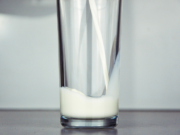









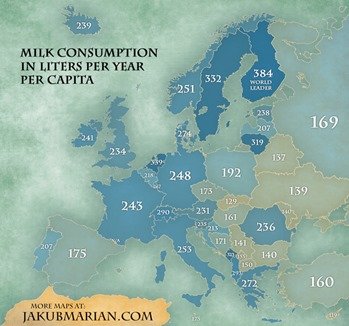
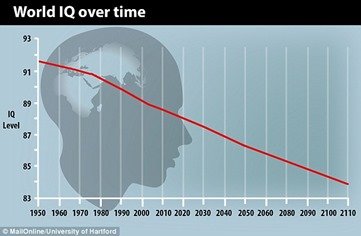
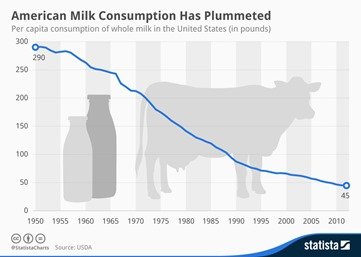
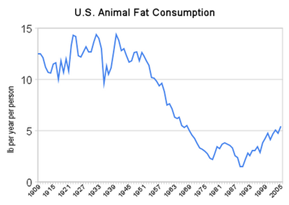
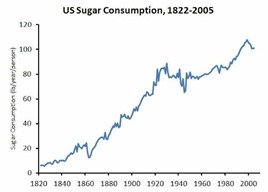





this is psudoscience. i know too too many people including myself and my family who cant consume dairy because it makes us very ill. gastro-intestinal issues and other problems from consuming dairy are well documanted. dairy is unhealthy for people and is only meant for baby cows. when i can eat so many alternatives why would I want to eat a food that hurts me?
The fact that milk helps you grow has been proven multiple times with science so I think well founded. With these studies on milk and mental health, there is good proof that milk is having a positive affect on your mental health. Gastrointestinal problem are a big problem these day from unhealthy diets. With milk consumption declining over the years, it is hard to blame this on milk. Plus milk has many beneficial bioactive compounds that foster healthy gut bacteria while suppressing the bad bacteria, viruses, and yeast. You need to recultivate a healthy gut, milk could really help you and your family.
Moderation in all things!
Amazing i read this for my essay, (i put it in my own words) This site is amazing, Cows are actually my fav animal